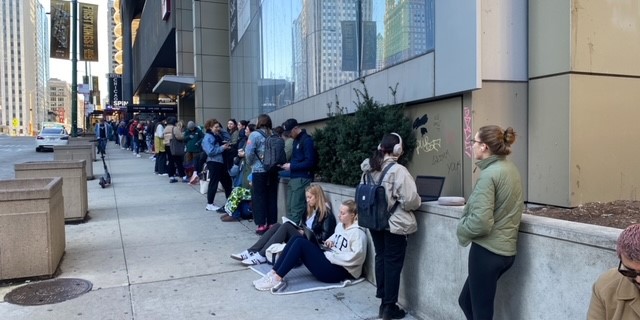We live in a social media world, where we can post our every move, our every thought.
But what happens when anonymous posers hijack your life and pretend to be you?
It happened to Maya Nordine, 23, of Chicago.
“This is offensive. I think anyone could agree that it’s offensive,” said Nordine. “I would be afraid I would lose job opportunities.”
Nordine, a recent graduate of Northeastern University, said in April, her mother found a fraudulent Facebook page, complete with Maya’s high school selfie and a vulgar post.
“I was really shocked,” said Therese Nordine, Maya’s mother. “She doesn’t talk like that. That’s not who she is.”
Maya said the page appears to have been created five years ago when she was still attending Lincoln Park High School, and she has no idea who’s behind it. Maya, who is in the process of applying for graduate school, said she feared this fake account would hurt her chances.
Local
“It’s really, really frustrating because I don’t know anybody or any woman who would want that post to be attached to their image,” said Maya.
For six months, Maya and Therese said they badgered Facebook to remove the account by reporting the page and by writing e-mails and letters.
“It is like a brick wall trying to get through to them,” said Therese. “Does it take a lawsuit to take that page down?”
According to experts in privacy law and social media, victims don’t have much legal recourse against the social media platform when imposters post damaging information.
“A federal law was designed to protect social media instead of protecting individuals,” said Lori Andrews, a professor of law at Illinois Institute of Technology-Chicago Kent College of Law.
Andrews cited the 1996 Communications Decency Act, which dictates that “no provider of user of an interactive computer service shall be treated as the publisher or speaker of any information provided by another information content provider.”
“Congress didn’t believe that (social media companies) should have to be an arbiter and look at every post and email you sent to see if you were defaming someone,” said Andrews. “It was to give them some protection for doing their business. What has happened though is the Internet has grown.”
Andrews said legislation has not kept up the evolving landscape of social media. She explained victims’ only legal recourse is to sue the imposter, but often times, they hide in the anonymity of the web.
“People are losing jobs, not getting into graduate school, are losing their chances to get life insurance, in some instances, based on what a stranger has put up about them,” said Andrews.
After NBC5 Investigates contacted Facebook about Maya’s case, a spokesperson said Facebook disabled the fraudulent account.
“Misrepresenting yourself on Facebook is against our policies, and we have a dedicated team that's tasked with helping to detect and block these kinds of scams,” said a Facebook spokesperson.
“We’ve developed several techniques to help detect and block this type of abuse. At the time someone receives a friend request, our systems are designed to check whether the recipient already has a friend with the same name, along with a variety of other factors that help us determine if an interaction is legitimate. Our team has also developed an alert that is sent when we discover multiple accounts with the same profile photo and name. The person receiving the alert has the option to report the account as a fake impersonating account. It's an area we're continually working to improve so that we can provide a safe and secure experience on Facebook.”
As for why Facebook didn’t disable the account until NBC5 Investigates contacted the company, Facebook said an internal error delayed the processing request.
For Maya and her family, this ordeal has been more than just a distraction.
“She’s my daughter. I just feel like she’s on the cusp of her life. She’s just starting out and she’s completely exposed by this horrible black mark that’s not her,” said Therese.
What can you do
Facebook encourages people to not accept suspicious friend requests and to report suspected phishing messages.
If you become a victim of an impersonating profile, Facebook advises legitimate users to report the profile.
Facebook said when people report impersonators, teams review each one and take the appropriate action, including setting checkpoints or shutting down profiles, if necessary.



